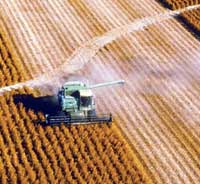Feedwatch: When is best to buy?

With the dry weather allowing many dairy herds to continue grazing late into the autumn, demand for feed has remained relatively quiet in recent weeks.
The protein markets appear to be easing back, albeit slowly, while cereal prices might just have peaked for the winter, but there are still opportunities to take good short-term cover on a number of feeds.
Soyabean meal markets have moved back at times, hitting the low £270s/t on occasion, but supplies in the UK through November are now tight, causing the spot market to return to about £280/t ex-port at the time of writing. For immediate requirements, the recommendation is still to keep to the spot market, but for next summer and even the second half of winter, some forward buying is now worth considering.
A record USA soyabean crop is being predicted (89mt), but harvest was delayed at the start of the season and there’s now a risk of frost damage in later months. It means that although prices are likely to settle down further for this winter, restricted supply from the USA may limit any downside in the markets. World demand remains strong compared to supply, and with the USA now officially out of recession, demand is only going to rise.
The good news to counter this comes from the excellent planting conditions in Brazil, plus continued predictions of much greater areas being planted to soyabeans across South America on the back of this year’s high prices. The net result is that forward contracts for the end of this winter are now coming close to matching those for next summer, with summer prices hopefully getting much closer to the £210-220/t mark than £300/t prices seen last year.
However, this very much depends on the progress of the South American crop after it’s planted.
Costs for Feb-Mar deliveries of soyabean meal are now about £10/t below those for Dec-Jan, and so are beginning to close on the May-Oct prices, which remain in the region of £50/t lower than the current spot price.
Any increase in protein meal demand as the global economy recovers is also likely to cause rapeseed meal values to increase. Prices for rapemeal have lifted slightly in recent weeks, so taking 75% cover on all winter requirements through to April would be a smart move.
The recovering USA economy is also having a big impact on the energy feed markets, with the dollar once again strengthening against Sterling. Slow progress with the corn harvest in the USA has also led to concern over the final harvest yield, resulting in the corn market recently trading at a four-month high.
However, in the UK, low cereal prices continue to limit volumes coming onto the market, with demand also low thanks to the good autumn weather extending the grazing season. Substantial numbers of mixed farmers appear to be taking the opportunity to include home-grown cereals into livestock rations rather than sell at current prices.
The wheat price did rise to about £100/t ex-farm, before falling back to the mid £90s/t, but it appears sensible to assume that we’ve now seen the bottom of the market pass, and there’s more global pressure for a gentle increase than a likelihood of any great reductions. A lack of supply onto the market, plus the upcoming Christmas interruptions in the production of many co-product energy feeds, means that securing at least 50% of what’s needed to see out the winter makes a lot of sense.
Flour, for example, is fetching a good price, encouraging the mills to keep production levels high at the moment. The resulting wheatfeed co-product remains the bargain of the winter as a result – £68-78/t for a 17% protein, low starch energy feed is good value, and ideal for feeding alongside maize and whole-crop silages, cereals and other high-starch feeds.
The priority now is to get important feeds booked through to January to cover any gaps in supply due to the upcoming holidays, with wheatfeed and rapemeal worth securing through to the end of the winter. However, many feeds are also coming under pressure in the run-up to Christmas, so if supplies of sugar beet feed, pressed pulp and brewers’ grains haven’t been booked yet, now’s the time to do so.
